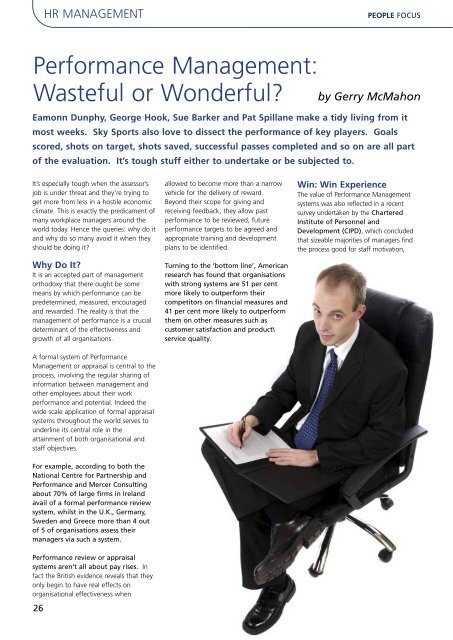PEOPLE FOCUS - CIPD
PEOPLE FOCUS - CIPD
PEOPLE FOCUS - CIPD
You also want an ePaper? Increase the reach of your titles
YUMPU automatically turns print PDFs into web optimized ePapers that Google loves.
HR MANAGEMENT<br />
<strong>PEOPLE</strong> <strong>FOCUS</strong><br />
Performance Management:<br />
Wasteful or Wonderful? by Gerry McMahon<br />
Eamonn Dunphy, George Hook, Sue Barker and Pat Spillane make a tidy living from it<br />
most weeks. Sky Sports also love to dissect the performance of key players. Goals<br />
scored, shots on target, shots saved, successful passes completed and so on are all part<br />
of the evaluation. It’s tough stuff either to undertake or be subjected to.<br />
It’s especially tough when the assessor’s<br />
job is under threat and they’re trying to<br />
get more from less in a hostile economic<br />
climate. This is exactly the predicament of<br />
many workplace managers around the<br />
world today. Hence the queries: why do it<br />
and why do so many avoid it when they<br />
should be doing it?<br />
Why Do It?<br />
It is an accepted part of management<br />
orthodoxy that there ought be some<br />
means by which performance can be<br />
predetermined, measured, encouraged<br />
and rewarded. The reality is that the<br />
management of performance is a crucial<br />
determinant of the effectiveness and<br />
growth of all organisations.<br />
A formal system of Performance<br />
Management or appraisal is central to the<br />
process, involving the regular sharing of<br />
information between management and<br />
other employees about their work<br />
performance and potential. Indeed the<br />
wide scale application of formal appraisal<br />
systems throughout the world serves to<br />
underline its central role in the<br />
attainment of both organisational and<br />
staff objectives.<br />
allowed to become more than a narrow<br />
vehicle for the delivery of reward.<br />
Beyond their scope for giving and<br />
receiving feedback, they allow past<br />
performance to be reviewed, future<br />
performance targets to be agreed and<br />
appropriate training and development<br />
plans to be identified.<br />
Turning to the ‘bottom line’, American<br />
research has found that organisations<br />
with strong systems are 51 per cent<br />
more likely to outperform their<br />
competitors on financial measures and<br />
41 per cent more likely to outperform<br />
them on other measures such as<br />
customer satisfaction and product\<br />
service quality.<br />
Win: Win Experience<br />
The value of Performance Management<br />
systems was also reflected in a recent<br />
survey undertaken by the Chartered<br />
Institute of Personnel and<br />
Development (<strong>CIPD</strong>), which concluded<br />
that sizeable majorities of managers find<br />
the process good for staff motivation,<br />
For example, according to both the<br />
National Centre for Partnership and<br />
Performance and Mercer Consulting<br />
about 70% of large firms in Ireland<br />
avail of a formal performance review<br />
system, whilst in the U.K., Germany,<br />
Sweden and Greece more than 4 out<br />
of 5 of organisations assess their<br />
managers via such a system.<br />
Performance review or appraisal<br />
systems aren’t all about pay rises. In<br />
fact the British evidence reveals that they<br />
only begin to have real effects on<br />
organisational effectiveness when<br />
26

















